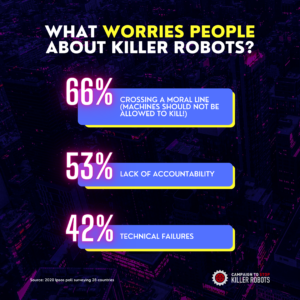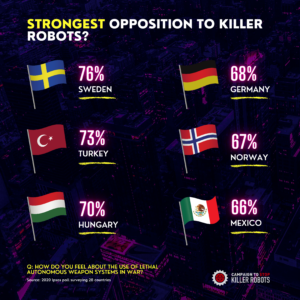A new survey in 28 countries finds that more than three in five people oppose using lethal autonomous weapons systems, commonly called “killer robots.” 62% of respondents said they oppose the use of lethal autonomous weapons systems, while 21% support such use and 17% said they were not sure.
Opposition was strong for both women (63%) and men (60%) although men are more likely to favor use of these weapons (26%) compared with women (16%). Opposition to killer robots was strong across generations and steadily increased with age, from 54% for those under 35 to 69% for ages 50 to 74.
The survey, conducted in December 2020 by the market research company Ipsos and commissioned by the Campaign to Stop Killer Robots, indicates that even with COVID-19 and economic uncertainty dominating headlines in 2020, public awareness of and sentiment against the development of killer robots remains steady and strong.
In response to these findings, Mary Wareham, coordinator of the Campaign to Stop Killer Robots, said:
“States must launch negotiations to create a new treaty to retain meaningful human control over the use of force. Public opposition to killer robots is strong, which raises expectations of bold political action to ban them.”
Opposition to killer robots has increased since 2017
Opposition to killer robots increased in 13 of the 26 countries previously surveyed in 2018, with the biggest increases in Brazil (up 16% points from 2018), Israel (up 12%), Japan (11%), and South Africa (up 7%) followed by Australia and Sweden (both up 5%). This is the third Ipsos survey in six years to survey opposition to killer robots. The first survey conducted in 2017 found that only 56% of those surveyed opposed killer robots. By 2020, opposition increased to 62%.

The 2020 Ipsos poll also asked those opposed to killer robots what concerned them the most. 66% answered that lethal autonomous weapons systems would “cross a moral line because machines should not be allowed to kill.” More than half (53%) said killer robots would be “unaccountable” and there is opposition (42%) due to concerns that killer robots would be subject to technical failures.
Detailed results by country
The 2020 Ipsos poll surveyed nearly 19,000 people, using samples of 500 to 1,000 people in each of the 28 countries: Argentina, Australia, Belgium, Brazil, Canada, China, Colombia, France, Germany, Great Britain, Hungary, India, Israel, Italy, Japan, Mexico, Netherlands, Norway, Peru, Poland, Russia, South Africa, South Korea, Spain, Sweden, Switzerland, Turkey, and United States.
A majority of respondents in 26 countries opposed killer robots. The only countries where a majority of respondents did not oppose killer robots were France (47%) and India (36%).The strongest opposition was in Sweden (76%), Turkey (73%), Hungary (70%), Germany (68%), Norway (67%), and Mexico (66%).

In 21 countries, 59% or more of respondents were opposed: Sweden (76%), Turkey (73%), Hungary (70%), Germany (68%), Norway (67%), Colombia (66%), Belgium (66%, Mexico (66%), Spain (66%), South Africa (66%), Peru (65%), Poland (65%), South Korea (65%), Australia (64%), Brazil (62%), Canada (60%), Switzerland (60%), Argentina (59%), Italy (59%), Japan (59%), and the Netherlands (59%).
Notably, a majority opposed killer robots in five countries most active in the development and testing of weapons systems with decreasing levels of human control: Russia (58%), UK (56%), US (55%), China (53%) and Israel (53%).
All countries surveyed by Ipsos have participated since 2014 in diplomatic meetings on concerns raised by lethal autonomous weapons systems. Those talks have been stalled since November 2020, when the Convention on Certain Conventional Weapons (CCW) failed to agree on its program of work in 2021.
“Public sentiment against fully autonomous weapons has not diminished,” Wareham said. “Now’s the time for strong preventive measures, not further diplomatic inaction.”










